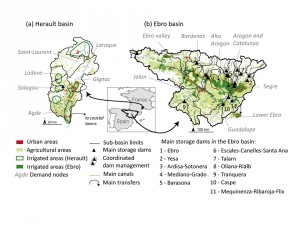Words on Wednesday aims at promoting interesting/fun/exciting publications on topics related to Energy, Resources and the Environment. If you would like to be featured on WoW, please send us a link of the paper, or your own post, ERE.Matters@gmail.com
****
Citation: Fabre, J., Ruelland, D., Dezetter, A., and Grouillet, B.: Sustainability of water uses in managed hydrosystems: human- and climate-induced changes for the mid-21st century, Hydrol. Earth Syst. Sci. Discuss., 12, 9247-9293, doi:10.5194/hessd-12-9247-2015, 2015.
Abstract. This paper assesses the sustainability of planned water uses in mesoscale river basins under multiple climate change scenarios, and contributes to determining the possible causes of unsustainability. We propose an assessment grounded in real-world water management issues, with water management scenarios built in collaboration with local water agencies. Furthermore we present an analysis through indicators that relate to management goals and present the implications of climate uncertainty for our results, furthering the significance of our study for water management. A modeling framework integrating hydro-climatic and human dynamics and accounting for interactions between resource and demand was developed and applied in two basins of different scales and with contrasting water uses: the Herault (2500 km2, France) and the Ebro (85 000 km2, Spain) basins. Natural streamflow was evaluated using a conceptual hydrological model. A demand-driven reservoir management model was designed to account for streamflow regulations from the main dams. Human water demand was estimated from time series of demographic, socio-economic and climatic data. Environmental flows were accounted for by defining streamflow thresholds under which withdrawals were strictly limited. Finally indicators comparing water availability to demand at strategic resource and demand nodes were computed. This framework was applied under different combinations of climatic and water use scenarios for the mid-21st century to differentiate the impacts of climate- and human-induced changes on streamflow and water balance. Results showed that objective monthly environmental flows would be guaranteed in current climate conditions in both basins, yet in several areas this could imply limiting human water uses more than once every five years. The impact of the tested climate projections on both water availability and demand could question the water allocations and environmental requirements currently planned for the coming decades. Water shortages for human use could become more frequent and intense, and the pressure on water resources and aquatic ecosystems could intensify. The causes of unsustainability vary across sub-basins and scenarios, and in most areas results are highly dependent on the climate change scenario.

Location, main water uses and water management characteristics of (a) the Herault
and (b) the Ebro basins. In the Herault basin, 6 sub-basins matching 6 demand nodes were
defined. In the Ebro basin, 20 sub-basins were selected for the simulation of water resources
and 8 demand nodes matching the main irrigation systems were defined.
